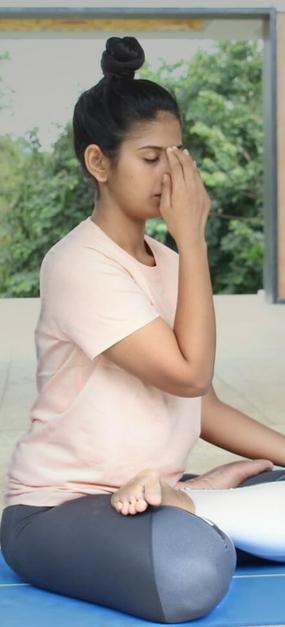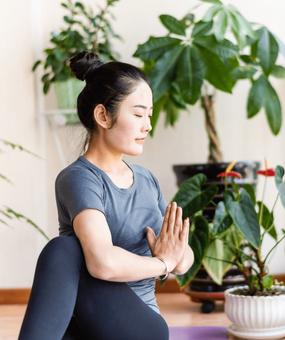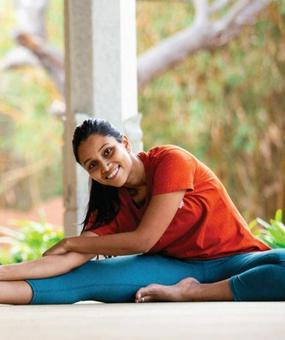In today’s fast-paced, technology-driven world, our minds are constantly bombarded with information, thoughts, and emotions. This mental chaos can lead to a state of disturbance, affecting our overall well-being. According to the principles of yoga, the root cause of this mental disturbance lies in our attachment to external stimuli and the inability to control our thoughts. Yoga for mental health is an excellent way to combat the constant noise in our heads and restore balance. It not only aids in physical well-being but also promotes yoga for peace of mind, allowing for clarity of thoughts. What can we do with this information overload and mental chaos? The ancient Indian tradition of yoga can come to our rescue, offering yoga poses for mental health that help calm the mind and body. Most successful people would agree that every great thing is manifested in the mind first, so it makes sense to give it the rest it deserves for effective functioning. Here we are sharing how, by investing just 15 minutes of your time, you can manage the mental traffic and achieve yoga for inner peace.
Practices for a Calm and Focused Mind
Here are some effective yoga techniques you can incorporate into your daily routine to manage mental disturbances and achieve a state of inner peace:
Om Chanting and Warming Up
Start your practice by chanting “om” three times. This simple act brings our minds to the present moment, setting the stage for a mindful and relaxing session. It is also important to start with a warming-up activity before attempting poses that your body is not accustomed to. This helps prevent injuries and eases you into a state of relaxation.
Pendulum Stretch
The Pendulum Stretch is a simple but effective warming-up exercise that relieves tension in the back and helps to rid your body of stiffness due to long hours of sitting. It is also a yoga pose for mental health, as it encourages gentle movement and breathing. To perform this stretch, sit
cross-legged on a yoga mat or on a chair and bend from side to side in a rhythmic fashion. Coordinate the movement with your breath, inhaling as you stretch toward one side, and exhaling as you return to the centre. This process can also bring yoga for inner peace by releasing pent-up stress.
Cat Stretch – Marjariasana
The Cat Stretch, or Marjariasana, is a gentle yoga pose that helps maintain a healthy spine. For this pose, kneel on the floor with your hands on the mat below your shoulders. As you inhale, look up, push your chest down, and lift your tailbone. When you exhale, tuck your chin to your chest and arch your upper back. This pose helps in achieving clarity of thoughts and aligns the spine, which can lead to a more peaceful state of mind.
Bhastrika– Bellows Breathing
Bhastrika is an energising breathing technique. It can provide an instant energy boost without caffeine or sugar. By performing this technique, you can quickly feel more alert, energised, and experience greater clarity of thoughts. Start by sitting on your heels or on a chair with a straight spine. Make loose fists with your hands and keep them in front of your shoulders. With each inhalation, take them straight up, and with each exhalation, bring them down. This exercise can lead to a sense of inner peace and focus.
Ardha Chakrasana – Standing Backward Bend
If you’re feeling anxious, stressed, or simply low for no reason, this yoga pose for peace of mind can help. Stand straight with your hands by your sides, then inhale as you stretch both arms above your head. As you exhale, bend backward from the waist, holding for a few seconds before coming back up while inhaling. This backward bend can help alleviate stress and provide yoga for inner peace.
Hastapadasana – Standing Forward Bend
Hastapadasana is great for the nervous system and the back. Start by standing straight with your hands by your sides. Inhale, extend your arms over your head, and as you exhale, bend down from the hips, keeping your spine straight. If your hands do not reach the floor, place them on your legs without slouching. This pose can help you achieve clarity of thought by easing tension and promoting relaxation.
Vakrasana – Spinal Twist
One often-ignored movement is twisting from side to side. This pose is a great way to release tension and encourage yoga for mental health. Sit with your spine erect and feet together. Bring your left hand to your right knee, and as you inhale, twist from the waist, looking over your right shoulder. Hold for a few seconds, then return to the front as you exhale. Repeat on the other side.
Bhujangasana – Cobra Pose
Bhujangasana improves breathing by opening the chest and strengthening the upper back. Lie on your stomach with your palms under your shoulders, then slowly lift yourself up from the strength of your back, straightening your arms slightly without locking them. This pose helps improve posture and encourages yoga for peace of mind.
Viparita Karani – Legs-Up-the-Wall Pose
Viparita Karani is one of the most relaxing postures, ideal for stress relief and promoting yoga for inner peace. Lie on your back with your feet straight up on the wall. Keep your buttocks as close to the wall as possible and relax your body. This simple pose can ease tension in the lower back and calm your mind.
Bhramari – Relaxing Pranayama
Bhramari pranayama is an excellent way to relax and can be performed by anyone, even those with high blood pressure or insomnia. Sit with a straight back and keep your index fingers on the cartilage just outside the ears. Inhale through the nose, then exhale with a humming sound. This pranayama can calm the mind, providing yoga for mental health and clarity of thoughts.
Nadi Shodhana – Alternate Nostril Breathing
Nadi Shodhana, or alternate nostril breathing, is known to balance subtle energy channels and remove toxins accumulated due to stress. Sit with the spine erect, and use your thumb and ring finger to close each nostril in turn, breathing in from one side and out from the other. This technique can balance the body’s energies and provide inner peace. These simple yoga techniques offer solutions to manage stress and find clarity in an age filled with distractions. They are designed to help us live in harmony, regardless of the situations we face in our daily lives. The benefits are inclusive and can be experienced by everyone, regardless of shape or size.








